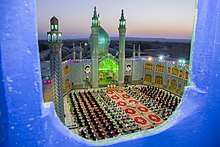Hilal ibn Ali
Hilal ibn Ali (Arabic: هِلَال ٱبْن عَلِيّ), also known as Muhammad al-Awsat (Arabic: مُحَمَّد ٱلْأَوْسَط, lit. 'the middle Muhammad'), was one of the sons of Ali. His grandmother was the eldest daughter of Muhammad, Zaynab, and his maternal uncle was Ali. His mausoleum was established in Aran, Kashan, Isfahan province, Iran. His mother, Umamah bint Abu al-'As, was the daughter of Zaynab, and grand-daughter of Muhammad and Khadija bint Khuwaylid.[1]
Muhammad al-Awsat Hilal ibn Ali | |
|---|---|
مُحَمَّد ٱلْأَوْسَط هِلَال ٱبْن عَلِيّ | |
 | |
| Born | 18 October 635 (1 Ramadan AH 14) |
| Died | 19 May 684 (Ramadan AH 64) Aran, Isfahan province, Iran |
| Known for | Being a great-grandson of the Islamic prophet Muhammad and Khadijah |
| Parents |
|
| Relatives |
|
| Family | House of Muhammad |
Biography
Hilal was born on 1 Ramadan, 14 AH (18 October 635 CE). Nothing is known about his life other than his role in the Battle of Karbala. He had a brother, 'Awn, who lived in Shaam or Ta'if (modern day Saudi Arabia). The governor of Khorasan, Qays ibn Murrah, feared an uprising against his rule, sent a strong army to fight followers of Hilal. In the ensuing battle, Hilal was injured, and his brother many of his followers killed. It is said that he wrote shortly before his death of a dream, in which his grandfather the Prophet Muhammad, his father Ali, and his half-brother Al-Husayn, were waiting for him to join them. So he fasted the next day, breaking his fast with an apple. He reported his dream on the following day to his companions, Ya'qoub and his son, and announced that he would be their guest in the evening, before dying in the night. Then after his death, Ya'qoub and his sons gave him a ritual bath, and buried his body, where a shrine now stands, acting as a place of refuge for friends and followers of the Ahl al-Bayt (members of the Household of Muhammad).[1]